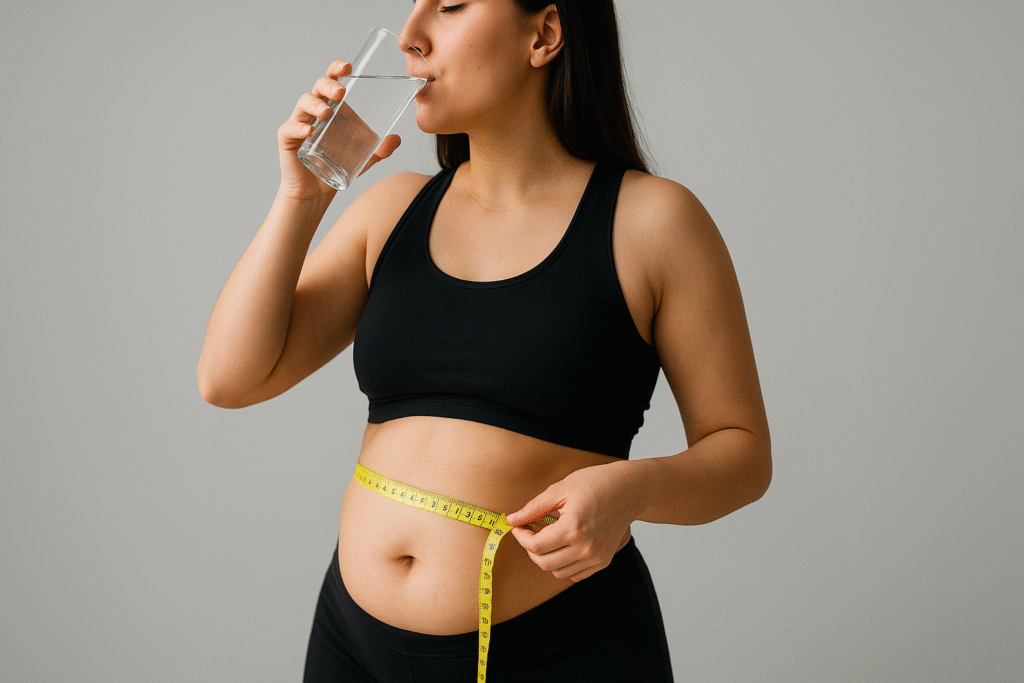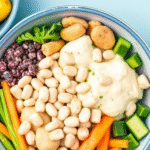Does Drinking Water Really Burn Belly Fat? The Truth Revealed
Do you ever wonder if drinking water can actually help you burn belly fat? Many people believe that staying hydrated is key to weight loss, but is there any truth to this claim? Let’s dive deep into the relationship between water and fat loss, especially around the belly area.
The Role of Water in Weight Management
Water is essential for our bodies. It plays a vital role in numerous bodily functions, including temperature regulation, nutrient transport, and waste removal. However, when it comes to weight loss, particularly belly fat, the relationship can be more complex.
- Hydration and Metabolism: Staying well-hydrated can boost your metabolism. When your body is functioning at optimal levels, it burns calories more efficiently.
- Reducing Appetite: Drinking water before meals may help you feel fuller, leading to reduced calorie intake. This can be particularly helpful for those looking to cut back on portion sizes.
- Caloric Replacement: Choosing water over high-calorie beverages can significantly decrease your daily caloric intake, fostering an environment conducive to fat loss.
How Water Affects Belly Fat Specifically
While drinking water alone will not directly burn belly fat, it can contribute to a caloric deficit, which is crucial for weight loss. Belly fat, often more stubborn than fat in other areas, requires a combination of factors for reduction. water into your diet might be beneficial in the following ways:
1. Enhanced Exercise Performance
When you’re properly hydrated, your workouts improve. Whether you enjoy cardio or strength training, drinking water ensures your body functions well. Improved performance means higher calorie burn, which can ultimately lead to fat loss.
2. Flushes Out Toxins
Our bodies naturally accumulate toxins, and drinking plenty of water aids in flushing these out. A cleaner system can support your metabolism and assist in fat reduction.
3. Supports Digestive Health
Water promotes healthy digestion. Proper digestion helps prevent bloating, which can give the appearance of a larger belly. By ensuring your digestive system is working efficiently, you can minimize unwanted abdominal discomfort and maintain a flatter look.
Best Practices for Water into Your Routine
To maximize the benefits of water intake for weight loss, consider the following strategies:
- Start Your Day with Water: Begin each morning with a glass of water to kickstart your metabolism.
- Drink Before Meals: Have a glass of water 30 minutes before meals to help control hunger and reduce calorie intake.
- Stay Consistent: Aim to drink at least 8 glasses of water throughout the day.
- Flavor Your Water: If plain water is not appealing, try infusing it with fruits or herbs for natural flavor.
Myths About Water and Weight Loss
It’s important to differentiate between facts and myths regarding water consumption and fat loss. Here are some common misconceptions:
| Myth | Fact |
|---|---|
| Drinking water directly burns fat. | Water does not burn fat, but it supports processes that facilitate fat loss. |
| You can lose belly fat by drinking water alone. | A comprehensive approach including diet and exercise is necessary for belly fat reduction. |
| All fluids count as hydration. | While other beverages contribute, water is the best source for hydration. |
Water alone won’t melt away belly fat, but it assists your weight loss journey in multiple ways. It is essential to combine adequate water intake with a balanced diet and regular exercise for significant results. For more information on weight loss strategies and the role of hydration, check out Healthline and Medical News Today.
Ultimately, drinking water is a simple and effective strategy to enhance your weight loss efforts. By understanding its role and implementing healthy habits, you can work toward achieving a flatter belly and overall wellness.
The Science Behind Water and Weight Loss
Water is essential for life, but it also plays a significant role in weight management. Research has shown that drinking water can support weight loss efforts, particularly when it comes to burning belly fat. This is a topic that has garnered attention in diets and fitness circles alike. Let’s delve into the science behind how water interacts with our bodies and its effect on weight loss.
The Role of Water in Your Body
Your body is composed of approximately 60% water. It acts as a solvent for various biochemical reactions, helps regulate body temperature, and transports nutrients to cells. When it comes to weight loss, staying hydrated is crucial for optimal metabolic function. Dehydration can slow down your metabolism, making it harder for your body to burn calories efficiently.
Water and Appetite Control
One interesting aspect of drinking water is its ability to help control your appetite. Several studies have shown that consuming water before meals can reduce hunger, leading to smaller portion sizes and fewer calories consumed overall. Here’s how it works:
- Fullness: Drinking water fills your stomach, prompting signals to your brain that you are full.
- Reduced Caloric Intake: When you substitute water for high-calorie beverages, you reduce total calorie consumption.
Water Temperature’s Impact on Metabolism
Not only does water play a role in satisfying thirst, but its temperature can also affect your metabolism. Drinking cold water may require your body to expend energy to heat it to body temperature, thus burning more calories in the process. This thermogenic effect of water is one of the reasons why it may assist in weight management.
Hydration and Exercise Performance
Staying hydrated is essential for maintaining optimal exercise performance. When you exercise, your body loses fluids through sweat. Dehydration can lead to fatigue, decreased endurance, and lowered performance levels. Hydration ensures that your workouts are effective, helping you burn more calories and effectively reduce belly fat.
The Connection Between Water and Fat Metabolism
Water plays a vital role in the process of fat metabolism. During lipid digestion, water is required for various enzymatic reactions that help break down fats into usable energy. When you are adequately hydrated, your body can efficiently metabolize fat. On the contrary, dehydration can hinder this process.
How Much Water Should You Drink?
The general recommendation is to drink at least eight 8-ounce glasses of water a day, also known as the “8×8 rule.” However, individual water needs can vary based on factors such as physical activity, climate, and overall health. Here’s a simple table to help you understand different factors that affect hydration:
| Factor | Recommended Daily Intake |
|---|---|
| General Adult | 2-3 liters (8-12 cups) |
| Active Individuals | 2.5-4 liters (10-16 cups) |
| Hot Climate | 3-5 liters (12-20 cups) |
Tips for Staying Hydrated
Here are some practical tips to boost your water intake throughout the day:
- Start Your Day: Drink a glass of water first thing in the morning.
- Carry a Water Bottle: Keep a reusable water bottle handy to remind you to drink regularly.
- Infuse with Flavor: Add slices of fruits or herbs to your water for a delicious twist.
- Set Reminders: Use phone alarms or apps that notify you to drink water throughout the day.
These strategies can make a significant difference in your hydration levels and, subsequently, your weight loss efforts. You can learn more about the benefits of drinking water and staying hydrated by visiting NCBI for research articles that support these claims. Another great resource is Healthline, which provides various insights on weight loss and hydration.
Drinking water has a multifaceted relationship with weight loss and belly fat reduction. By understanding the science behind it and staying hydrated, you enhance your chances of achieving your health goals.
Hydration and Metabolism: Understanding the Connection
Understanding the link between hydration and metabolism is key for anyone looking to enhance their health and wellness. Water plays a critical role in almost every bodily function, and its influence on metabolic activities is no exception. When you drink enough water, you not only stay hydrated but also support various biological processes that can impact your energy levels, weight management, and overall metabolic rate.
The human body is composed of approximately 60% water, making hydration essential for maintaining balance. When you are well-hydrated, your body can perform optimally, ensuring that metabolic functions proceed efficiently. This doesn’t just mean that you feel better; it also translates directly to how your body utilizes food and energy.
The Role of Water in Metabolism
Water plays several critical roles in metabolism, including:
- Temperature Regulation: Water helps to regulate body temperature, which is vital for metabolic reactions.
- Nutrient Transportation: It transports nutrients to cells and helps remove waste products, allowing your body to utilize energy effectively.
- Digestive Aid: Proper hydration is necessary for digestion and ensures that food gets broken down efficiently, maximizing energy extraction.
- Hormonal Balance: Hormones that regulate metabolism require water to work well. For instance, insulin, which helps manage blood sugar levels, is influenced by hydration levels.
Hydration and Weight Management
Many people pursue weight loss strategies, and staying hydrated can play a significant role in this process. Studies demonstrate that drinking water may actually enhance metabolism in the short term. According to research published in the Journal of Clinical Endocrinology & Metabolism, drinking water can increase metabolic rate by up to 30% for about 30-40 minutes after consumption. This boost happens because your body uses energy to heat the water to body temperature.
Add drinking water before meals to the list of strategies for weight management. When you consume water before eating, it can lead to decreased calorie intake. In a study by Obesity (Silver Spring), participants who drank water prior to meals consumed fewer calories and lost more weight compared to those who did not.
Signs of Dehydration
Recognizing signs of dehydration is essential for maintaining your metabolic rate. Here are some common indicators:
- Thirst
- Dark yellow urine
- Dry mouth
- Fatigue or lethargy
- Headaches
If you experience any of these symptoms, you should increase your fluid intake. Staying adequately hydrated can help improve not just your metabolism but your overall energy and health.
Hydration Recommendations
To optimize your metabolism, consider these hydration tips:
- Drink at least eight 8-ounce glasses of water daily, a common recommendation.
- Increase your intake when exercising or in hotter climates.
- Consume fruits and vegetables with high water content, such as cucumbers, oranges, and melons.
- Caffeine and alcohol can contribute to dehydration; limit these substances and drink more water if you consume them.
Final Thoughts on Metabolism and Hydration
Effective hydration is vital for ensuring your metabolism functions at its best. By drinking enough water, you can enhance your energy levels, maintain balanced hormonal levels, and even support weight management efforts. Start incorporating these hydration strategies into your daily routine, and notice how they make you feel.
For more detailed information about hydration and its effects on health, visit Mayo Clinic’s hydration guide or the National Institutes of Health’s Water and Health Resource page.
Common Myths About Water Consumption and Fat Reduction
When it comes to water consumption and fat reduction, there are many misconceptions that can mislead individuals on their health journey. Understanding the facts behind these myths is crucial in making informed decisions about hydration and weight management.
Myth 1: Drinking Water Alone Will Make You Lose Fat
Many people believe that simply increasing water intake will lead to weight loss. While staying hydrated is essential for overall health, drinking more water is not a magic solution for burning belly fat. Water does support your metabolism, but it needs to be combined with a balanced diet and regular exercise for effective fat reduction.
Myth 2: Cold Water Burns More Calories
Another common belief is that drinking cold water helps burn more calories because your body has to work harder to warm it up. While it’s true that your body uses energy to heat the water to body temperature, the calorie burn is minimal, only approximately 8 calories for a glass of cold water. The impact of this calorie burn is negligible for significant weight loss.
Myth 3: You Need to Drink Eight Glasses of Water Daily
The “8×8” rule (eight glasses of eight ounces of water each day) is widely cited as the optimal amount of water to drink. While staying hydrated is key, the actual water needs vary from person to person based on factors like activity level, climate, and diet. Instead of aiming for a specific number, listen to your body and drink when you’re thirsty.
Myth 4: Drinking Water Before Meals Reduces Appetite Significantly
Drinking water before meals can help you feel fuller, reducing the chances of overeating. However, this effect is not as strong as many believe. A study published in the journal Obesity found that while water consumption before meals may help reduce calorie intake, it should not be solely relied upon for significant weight loss. A holistic approach to diet is essential.
Myth 5: Flavored and Sparkling Water Count as Hydration
While flavored and sparkling waters can contribute to hydration, it’s essential to be cautious about added sugars and artificial ingredients that may negate health benefits. Always check ingredient labels to ensure you’re not consuming unnecessary calories or unwanted additives.
Myth 6: Diuretics Are a Good Replacement for Water
Some individuals may mistakenly believe that diuretics (substances that increase urine output) can replace water for fat loss. This could not be further from the truth. Diuretics can lead to dehydration, electrolyte imbalances, and other health problems. Water is essential for optimal body function and cannot be substituted with diuretics.
Staying Hydrated: The Key to Healthy Weight Management
While hydration plays a role in your overall health, it’s crucial to focus on a balanced lifestyle. Here are steps to incorporate healthy water habits:
- Drink water regularly throughout the day.
- Choose water over sugary drinks and sodas.
- Monitor your body’s hydration needs based on activity and climate.
- Combine drinking water with a balanced diet and regular exercise.
Additional Resources
For more insights on hydration and health, check out the following resources:
- Healthline: Drinking Water to Burn Fat
- WebMD: Drinking Water and Weight Loss
- Mayo Clinic: Does Drinking Water Help with Weight Loss?
Separating fact from fiction regarding water consumption and fat reduction is critical for anyone looking to improve their health. By understanding these common myths, you can make better choices about hydration and avoid potential pitfalls in your weight management efforts. Remember, there are no quick fixes, and health is a journey that involves consistent effort and informed decisions.
How Much Water Should You Drink for Weight Loss?
Staying hydrated is essential for overall health, but how much water should you drink for successful weight loss? The answer is not as simple as it might seem. Your unique needs depend on various factors, including your body weight, physical activity level, and diet.
Water plays a crucial role in many bodily functions, including digestion and metabolism. Drinking adequate water can also help control hunger, which can prevent overeating. Studies indicate that drinking water can increase the number of calories you burn, a process called thermogenesis.
So, what’s the magic number when it comes to daily water intake? While there are generic recommendations, you may need to adjust your consumption based on the following:
- Body Weight: A common suggestion is to drink half an ounce to an ounce of water for every pound you weigh. For example, if you weigh 150 pounds, that translates to about 75 to 150 ounces of water daily.
- Activity Level: The more active you are, the more water you’ll need. If you’re exercising or working in a physically demanding job, aim for a higher intake.
- Climate: Hot or humid environments can increase your need for hydration, as you lose more fluids through sweat.
- Diet Composition: High-sodium, high-sugar, or high-protein diets can also dehydrate you. Make sure to compensate with extra water.
Additionally, a good rule of thumb is to drink water before meals. Research shows that drinking water before meals can help reduce calorie intake and assist in weight loss. If you’re not a fan of plain water, try infusing it with fruits such as lemon or cucumber for added flavor. This can make hydration more enjoyable and may encourage you to drink more.
While water is essential, it’s important to listen to your body. Thirst can be a reliable indicator of when you need to drink. However, it’s crucial to pay attention to the color of your urine as well. If it’s light yellow, you’re likely well-hydrated. Dark yellow urine may indicate that you need to drink more fluids.
Here’s a simple table to summarize the recommended water intake based on body weight:
| Body Weight (lbs) | Water Intake (oz) |
|---|---|
| 100 | 50 – 100 |
| 150 | 75 – 150 |
| 200 | 100 – 200 |
| 250 | 125 – 250 |
When considering weight loss, it’s not just about drinking water. Combine hydration with a balanced diet and regular exercise to see optimal results. Foods that contain high water content, such as fruits and vegetables, can contribute to your overall hydration. Examples include watermelon, oranges, and cucumbers. Eating these foods can help you meet your hydration goals while providing essential vitamins and minerals.
To better control your appetite and manage your weight, try tracking your water intake. Use apps or journals to note how much water you drink daily. This can help you identify patterns and adjust your habits as needed. Aim for consistent intake throughout the day rather than chugging large amounts all at once.
If you’re looking for additional information about hydration and its impact on weight loss, check out resources from the Centers for Disease Control and Prevention and WebMD.
Remember, there’s no one-size-fits-all solution for water intake. Tailor your fluid consumption to fit your lifestyle, and don’t hesitate to seek guidance from a healthcare professional for personalized advice. By making hydration a priority, you will enhance your weight loss efforts while enjoying the numerous health benefits of drinking water.
The Role of Water in a Balanced Diet
Water plays a vital role in maintaining a balanced diet and is essential for overall health. It supports numerous bodily functions and contributes to your daily nutritional needs. Here, we delve into the many benefits of water in your diet and how it aids in your health journey.
Essential Functions of Water
Water is not just a thirst quencher; it performs several essential functions in your body:
- Regulating Body Temperature: Water helps maintain a stable internal temperature, enabling your body to function optimally.
- Aiding Digestion: It assists in breaking down food, which enhances nutrient absorption.
- Transporting Nutrients: Water carries essential nutrients and oxygen to cells, supporting cellular health.
- Removing Waste: It aids kidneys in flushing out toxins and waste products from your body.
- Supporting Metabolism: Proper hydration can help speed up metabolism and improve the efficiency of calorie burning.
Hydration and Weight Management
Maintaining proper hydration levels is important not only for overall health but also for weight management. Drinking enough water can impact your weight in several ways:
- Appetite Control: Drinking a glass of water before meals can help you feel fuller, which may contribute to reduced calorie intake.
- Calorie Replacement: Choosing water over sugary beverages not only cuts calories but also helps you stay hydrated without added sugars.
- Increased Energy Levels: Staying hydrated helps maintain your energy, allowing you to stay active, which is crucial for any weight loss plan.
How Much Water Do You Need?
While the commonly recommended amount is eight 8-ounce glasses per day, individual needs may vary based on factors such as age, activity level, and climate. A more tailored approach includes:
| Factors | Recommended Daily Intake |
|---|---|
| General Adult | 2.7 liters (for women) and 3.7 liters (for men) |
| Active Individuals | Additional 1.5 to 2.5 liters depending on exercise |
| Hot Climate | Increase intake to compensate for sweat loss |
Listening to your body is vital. Thirst is an important signal, but it’s best to drink water consistently throughout the day, even if you don’t feel thirsty.
Water into Your Diet
Here are some effective ways to ensure you are getting enough water in your diet:
- Start Your Day with Water: Make it a habit to drink a glass of water first thing in the morning.
- Flavor Your Water: Adding fruits or herbs can enhance the taste and encourage you to drink more.
- Set Reminders: Use apps or alarms to remind you to drink water regularly.
- Infuse with Fruits: Infused water with slices of lemon, cucumber, or mint can make hydration more enjoyable.
Water-Rich Foods
In addition to drinking water, incorporating water-rich foods into your diet can help you stay hydrated:
- Cucumbers
- Tomatoes
- Watermelon
- Spinach
- Strawberries
These foods not only provide hydration but also come packed with essential vitamins and minerals that contribute to a balanced diet.
: The Takeaway
The importance of water in a balanced diet cannot be overstated. It is a key player in maintaining your health and well-being. Ensuring that you drink enough water and include water-rich foods in your meals can significantly contribute to your diet and overall fitness. For more information on hydration and nutrition, visit Choose My Plate or Eat Right.
Practical Tips for Staying Hydrated Throughout the Day
Staying hydrated throughout the day is essential for maintaining good health. It helps improve energy levels, enhances focus, and supports proper bodily functions. Here are some practical tips to keep your hydration levels up, making it easier for you to drink enough water without even thinking about it.
Set Clear Hydration Goals
Establishing clear hydration goals can motivate you to drink more water. Consider the following:
- Track your daily water intake. Aim for at least eight 8-ounce glasses, or about 2 liters, per day.
- Monitor how much water you drink with apps like WaterLog or HydrateMe.
Keep Water Accessible
Having water readily available makes it more likely you’ll drink it. Here’s how to achieve this:
- Carry a reusable water bottle wherever you go.
- Fill multiple bottles at the beginning of the day and place them in different locations, like at your desk, in your car, or by your bed.
Add Flavor to Your Water
If plain water seems boring, add some flavor to make it more appealing:
- Add slices of lemon, lime, or cucumber.
- Infuse water with fresh herbs, such as mint or basil.
- Use flavored water enhancers in moderation, avoiding those with added sugars and artificial ingredients.
Hydrate During Meals
Drinking water during meals can improve your hydration without any extra effort. Here are some ways to do that:
- Start with a glass of water before your meals.
- Opt for broth-based soups as a starter.
- Drink water with your meals and snacks to enjoy the flavors better.
Use Technology to Your Advantage
Consider using technology to remind yourself to drink water:
- Set reminders on your phone to take a water break.
- Utilize smart water bottles that track your intake and send reminders.
Engage in Hydrating Foods
Food can also be an excellent source of hydration. Consider including:
| Food | Water Content (%) |
|---|---|
| Watermelon | 92 |
| Cucumber | 95 |
| Strawberries | 91 |
| Celery | 95 |
| Spinach | 91 |
Incorporate these foods into your meals to enhance your hydration.
Drink Herbal Teas
Herbal teas are a great alternative to plain water. They contain various health benefits and keep you hydrated. Options to consider:
- Chamomile tea, known for its calming effects.
- Green tea, which is rich in antioxidants.
- Ginger tea, helpful for digestion.
Make Hydration a Social Activity
Encouraging friends or family to join you in staying hydrated can make it more fun:
- Plan water challenges to see who can drink the most water each week.
- Organize social gatherings that include hydrating foods and beverages.
Listen to Your Body
Pay attention to your body’s signals. Thirst is an obvious sign but also look for:
- Dry mouth or throat.
- Dark yellow urine.
- Fatigue or headaches.
These could indicate that you need more fluids.
Staying hydrated is fundamental for your overall health. By following these practical tips, you can easily increase your water intake throughout the day, leading to better health and well-being. For more information about hydration and wellness, consider visiting Nutrition.gov or CDC Nutrition for trustworthy resources.
Key Takeaway:
When exploring the topic of whether drinking water really burns belly fat, it’s essential to understand the nuanced relationship between hydration and weight loss. The truth is, drinking water alone does not directly burn belly fat. However, it plays a significant role in supporting overall weight loss efforts. Here are the key takeaways from our exploration of this subject.
First, the science behind water and weight loss reveals that staying adequately hydrated can enhance metabolism. When you are well-hydrated, your body functions optimally, which can support fat-burning processes. Research indicates that drinking water can temporarily boost your metabolic rate. Additionally, water helps in suppressing appetite, which may lead to lower calorie intake—something very beneficial for those striving to lose weight, particularly around the belly area.
It’s important to grasp the correlation between hydration and metabolism. Proper hydration can improve metabolic functions, thereby aiding in fat reduction. Conversely, dehydration can lead to a sluggish metabolism and reduced energy levels, making it harder to maintain an active lifestyle necessary for weight loss.
Nevertheless, several misconceptions exist about water consumption and fat reduction. Some people believe that simply drinking excess water will lead to significant fat loss, but this is not the case. Overconsumption may lead to water retention instead of fat loss. Understanding the right amount of water to drink is crucial; generally, health experts recommend about 8-10 cups per day, but individual needs may vary based on factors like activity level, climate, and body weight.
Moreover, water plays a vital role in a balanced diet. It aids digestion and assists your body in absorbing essential nutrients. Tips for staying hydrated throughout the day include drinking a glass of water before each meal and incorporating water-rich foods like fruits and vegetables into your diet.
While drinking water alone won’t burn belly fat, it is a foundational element of an effective weight loss strategy. By staying hydrated, supporting metabolism, curbing appetite, and complementing it with a healthy diet and exercise, you can enhance your fat loss efforts.
Conclusion
Drinking water plays a crucial role in your journey toward losing belly fat, but it’s important to understand its function within a broader context. It may not directly burn fat, but staying well-hydrated can significantly boost your metabolism and improve overall bodily functions. The science shows that adequate water intake supports efficient calorie burning and aids the digestion process, which can contribute to weight loss over time.
The connection between hydration and metabolism is vital. When your body is well-hydrated, it operates more efficiently, leading to better energy use and fat management. Misconceptions about water consumption often lead people astray, as simple hydration alone won’t miraculously melt away belly fat. Instead, combining proper hydration with a balanced diet and regular physical activity yields the best results.
Knowing how much water to consume is equally important. Aim for at least eight 8-ounce glasses daily, adjusting for activity levels and climate. This habit will not only help maintain hydration but also encourage you to make healthier food choices. Remember that water is an essential part of a balanced diet, playing a supportive role in the digestion and absorption of nutrients.
To stay hydrated throughout the day, consider keeping a water bottle handy, adding fruit for flavor, or setting reminders to take regular sips. By prioritizing your hydration and recognizing its role in weight management, you can take effective steps toward achieving your goals. Ultimately, drinking water is a valuable part of a healthy lifestyle that can help you feel better while supporting your efforts to lose belly fat.











